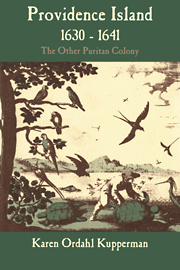Book contents
- Frontmatter
- Contents
- List of Maps
- Preface
- Author's Note
- 1 The Providence Island Company and Its Colony: The Program
- 2 Founding a Colony on Providence Island
- 3 Contested Authority: The Governorship of Captain Philip Bell
- 4 Frustrated Hopes for Economic Development
- 5 Land and Society: The Middling Planters
- 6 Servants into Slaves
- 7 Military Requirements and the People's Response
- 8 The Turbulent Religious Life of Providence Island
- 9 Governing Puritan Privateers: The Governorships of Robert Hunt and Nathaniel Butler
- 10 The Business History of the Providence Island Company
- 11 The End and Persistence of Providence Island
- Appendixes
- Bibliographical Essay
- Index
8 - The Turbulent Religious Life of Providence Island
Published online by Cambridge University Press: 24 November 2009
- Frontmatter
- Contents
- List of Maps
- Preface
- Author's Note
- 1 The Providence Island Company and Its Colony: The Program
- 2 Founding a Colony on Providence Island
- 3 Contested Authority: The Governorship of Captain Philip Bell
- 4 Frustrated Hopes for Economic Development
- 5 Land and Society: The Middling Planters
- 6 Servants into Slaves
- 7 Military Requirements and the People's Response
- 8 The Turbulent Religious Life of Providence Island
- 9 Governing Puritan Privateers: The Governorships of Robert Hunt and Nathaniel Butler
- 10 The Business History of the Providence Island Company
- 11 The End and Persistence of Providence Island
- Appendixes
- Bibliographical Essay
- Index
Summary
IN PROVIDENCE ISLAND as in all puritan colonies religion functioned both as a binding force and as a source of disruption and controversy. Like its contemporary, Massachusetts Bay, the colony was founded as the nucleus of a great colonial experiment in the protection and extension of reformed Protestantism in the face of a hostile English government seemingly intent on returning the nation to some form of Roman Catholicism. Religious goals continued to play a major part in the founders' thinking throughout the settlement's existence until the grandees were distracted by ecclesiastical issues at home with the meeting of the Long Parliament. The leading figures among the settlers were always concerned to achieve a fulfilling Christian life in their little island. This quest led them by a tortuous path through the same issues that troubled old and New England: toleration of dissent, the role of the laity in church governance and worship, and the relationship of religious and civil authority.
These were troubling issues because colonization offered unprecedented opportunities for free expression and for unfettered construction of religious societies. Historians of colonial America have assumed that Massachusetts Bay's New England Way, which strictly controlled religious expression and conferred church membership only on those judged to be “visible saints” by the congregations while restricting voting and office holding to church members, represented the fullest expression of the system all puritans would have chosen. The experience of Providence Island offers evidence that not only did mainstream English puritans not choose such a link between sainthood and political rights, with the enormous power it conferred on the religious arm, but many saw the Massachusetts experiment as dangerously deviant.
- Type
- Chapter
- Information
- Providence Island, 1630–1641The Other Puritan Colony, pp. 221 - 266Publisher: Cambridge University PressPrint publication year: 1993



